#good omens headshake
Explore tagged Tumblr posts
Text
My Favorite Good Omens Moment:
An Essay on Why It Is Cool and Rad (Part 1)
There's this moment in Good Omens that makes me cackle every time I see it and leaves me full of warmth, so here's an essay on its context and meaning, because explication and analysis are how I show love. I will try to keep my thoughts as tight as possible, but they do have a tendency to spiral outwards, and I am very stoned. Come, sistren, and get nerdy with me.
My favorite moment in the series so far occurs in 1601. To approach it we will first need an assload of context. There's a TL;DR in bold at the end of the Context if you don't fancy reading the whole assload. Key arguments are in italics and bold throughout.
David Tennant gives Crowley a very consistent facial expression every time Aziraphale says something so outlandish Crowley can't quite believe he's hearing it. It's this one:
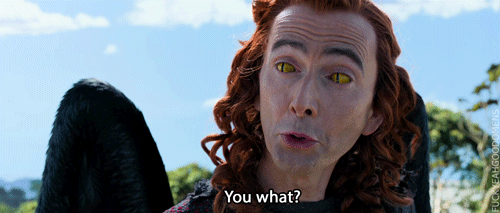
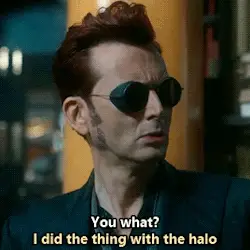
Chronologically, we see the Eyebrows of Disbelief twice before my fave moment in 1601: once (above left) in that scene on the Garden Wall that familiarizes the audience with Crowley's face before adding the dark glasses, when Aziraphale admits he's given away his sword; once when Aziraphale tells Bildad the Shuhite that he, Aziraphale, has Fallen because he lied to the angels to save Job's children.
The Eyebows of Disbelief always signal surprise and amusement with something Aziraphale has said or done. This amusement is sometimes at Aziraphale's expense and sometimes not.
In the gifs above, Crowley is laughing because what Aziraphale has just admitted to doing is fantastic and unexpected and frankly pretty gd punk rock. He's not laughing at Aziraphale, he's laughing because he is delighted with him. The only record we have thus far of Crowley laughing at Aziraphale is this one:
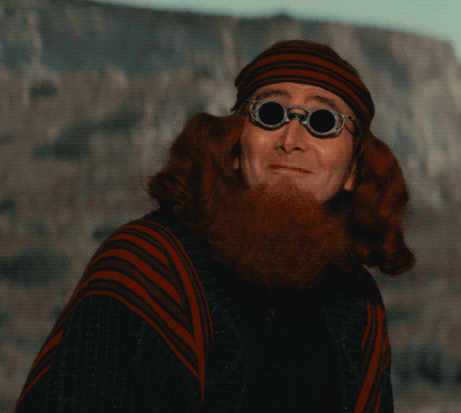
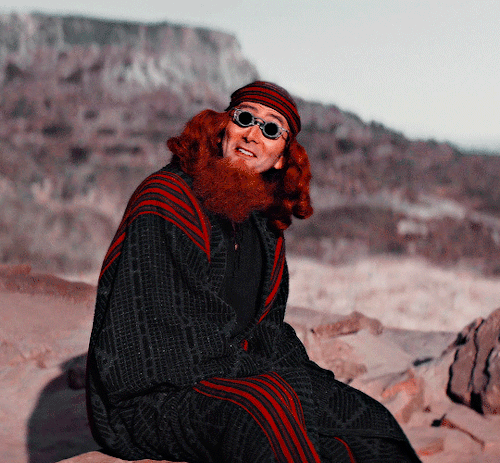
Crowley laughs when Aziraphale informs him--him, a demon who has personally been through the process of Falling--that Aziraphale is Fallen and must be a demon now. As though of the two of them Aziraphale is the expert on how and under what circumstances this occurs.
And yet when Crowley sees Aziraphale's distress--not his fear of being taken to Hell, but his heartbreak and lostness over the fact that his conscience has diverged from God's stated will--Crowley stops laughing, and instead he acts very kindly towards Aziraphale. He validates the gravity of what Aziraphale has done and assures him he won't turn him in. He sits with him so Aziraphale isn't totally alone (like Crowley probably was) as he goes through the loneliest moments of his existence to that point and picks himself up newly weighted with the secret he must now bear.
And after this scene (in canon as it stands thus far), we don't see Crowley laugh at anything Aziraphale says or does again.
And he really has to work for it sometimes. We talk a lot about the things Michael Sheen is able to convey with his face in Good Omens, and absolutely rightly so; David Tennant earns a chunk of his paycheck in this regard as well. If you haven't given yourself the treat yet, rewatch the scene in Will Goldstone's magic shop in 1941 and focus on Crowley's reactions:
youtube
Tennant takes great care to show, with precision, that Crowley is expending effort not to react to Aziraphale's nervous chaos Muppetry and lack of self-awareness. Crowley is self- and socially and contextually aware enough that he knows (better than Aziraphale, at least, which is not a high bar to clear) what's cringe, what's funny, what's ridiculous, how to behave. But whenever Aziraphale crosses a boundary of normalcy, or even sanity, and there is opportunity to laugh at him, Crowley very carefully doesn't react. He doesn't interrupt him, he doesn't try to correct him, he doesn't make fun of him, he doesn't even smirk; he just watches him, as stone-faced as he can manage, no matter how bizarre Aziraphale becomes.
We should be reading this lack of reaction to Aziraphale's social and rational transgressions as powerful positive action. Go watch the Doctor Who episode "Human Nature," or literally any episode of The Inbetweeners, or read or watch Regeneration, and reflect on what it shows you about English masculinity; then consider again the depth of significance in how English- and male-coded character Crowley treats English- and male-coded character Aziraphale in an England created by an English and male-codedpresenting author based off a book written by himself and another male-presenting author. Within its context of English masculinity, Crowley's lack of reaction is not a neutral stance; it is a very fucking loud show of support.
This is not even an inference; it's stated outright in the show. Crowley himself puts it into words 422 years after my favorite moment:
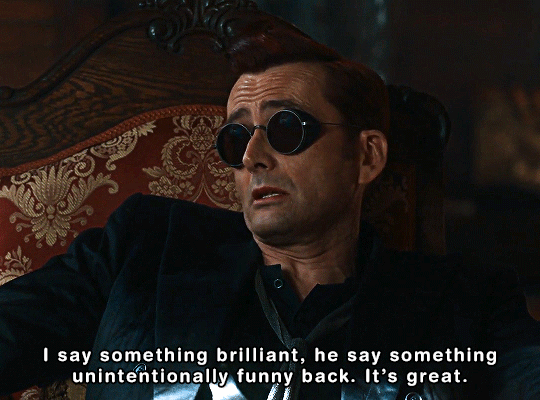
You know how Crowley calls Aziraphale "angel" because the factuality of the descriptor offers him plausible deniability to any Heavenly or Infernal agents who might be listening? Remember how Crowley is a great equivocator? Crowley is equivocating here, too: he's using the cover of what Maggie and Nina will take as a disparaging joke at Aziraphale's expense in order to make a perfectly sincere statement. This is his genuine perception of one of the relationship dynamics he has with Aziraphale and how he feels about that dynamic. Crowley thinks he himself is quite witty (an accurate assessment), Crowley thinks Aziraphale isn't sufficiently self- or contextually aware to hide how strange he is and therefore frequently says and does mad things (also an accurate assessment), and Crowley is Into. That. Shit.
Okay. Now let's look at 1601.
Chronologically it's been almost 1,000 years since we last saw Aziraphale and Crowley. In 537, Aziraphale isn't willing even to consider a labor-saving working arrangement with Crowley of fucking off home out of the damp of Arthurian Wessex; but by 1601, he's worked (and met, and Arranged) with Crowley "dozens of times now," Crowley says, and Azirapahle does not correct him.
In that millienium, Aziraphale has grown to care deeply about Crowley:

In fact he may be somewhat smitten with him:

Seriously, go back and watch Aziraphale here as Crowley approaches and starts speaking to him: he doesn't start smiling until he recognizes that the person speaking to him is Crowley (but he only smiles at Crowley while Crowley's not looking at him).
And Crowley is definitely become smitten with Aziraphale:
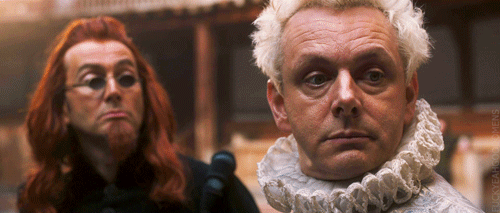
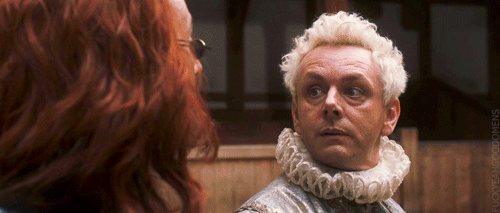
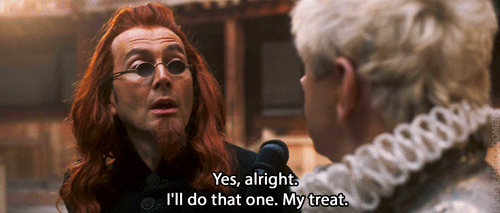
Our man(-shaped entity) is so allergic to work he sets up a meeting to weasel, cajole, or (as it happens) cheat a coin toss to get Aziraphale to do an easy temptation for him in Edinburgh, and then in the same conversation agrees to miracle a play into success because Aziraphale gives him a single hopeful look. Crowley's got it bad.
TL;DR: The Eyebrows of Disbelief happen when Crowley is surprised and amused by something Aziraphale has said or done. Sometimes that amusement is delight with Aziraphale; sometimes it is at Aziraphale's expense. Crowley is aware of this distinction, and when his amusement is at Aziraphale's expense, he suppresses it, even when it takes some effort on his own part, and remains stocially composed. This is equivocation on his part: to Celestial/Infernal operatives lacking knowledge of the intricacies of human behavior, this non-reaction would seem like neutrality; to Aziraphale, who shares with Crowley and the audience the contextual knowledge of English masculinity's utter viciousness, this non-reaction is a profound show of support; and in the safety of support from Crowley, Aziraphale lets his weirdness blossom.
As another meta points out [link if I find it again], we also see in Aziraphale's wordless request about Hamlet and Crowley's immediate understanding of it that by 1601 Aziraphale and Crowley have developed an unspoken, coded method of communication with each other.
Now that we have all of that in mind, here's my favorite moment in Good Omens:
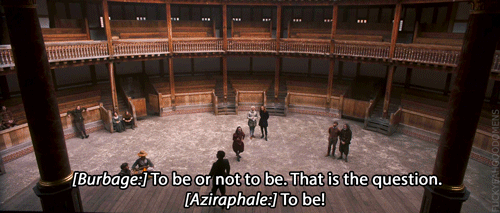
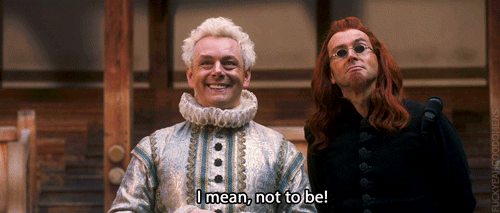
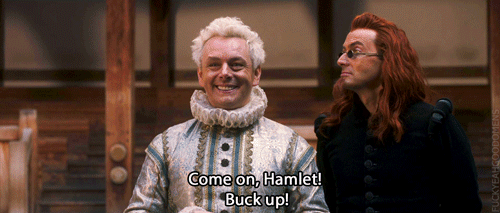
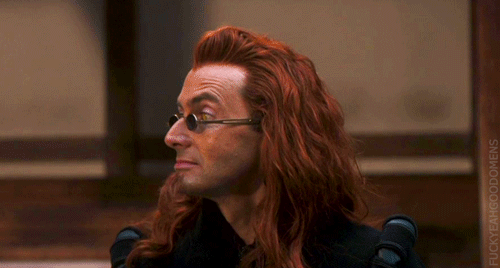
Ixi of Fuck Yeah Good Omens has even kindly archived a closeup of the aftermath, for Crowley, of "Buck up!" In gif 4, above, you can see that the tiny smile is an involuntary reaction that happens as Crowley's eyes widen: for a fraction of a second, he's caught off-guard. In the closeup it's easier to see that he suppresses the smile and gives a tiny shake of his head, Eyebrows of Disbelief heading for his hairline.
There are a number of things Crowley's reaction could mean and what messages it could communicate (we'll get to that in a sec), but regardless, his reaction is, unquestionably, one of surprise and suppressed amusement. This is an aspect of Crowley and Aziraphale's relationship and characters that I like very much, viz., that one of the reasons Crowley likes Aziraphale (though Aziraphale is judgy and occasionally, unintentionally, horrifyingly cruel) is that in addition to being one of the kindest and most courageous beings in existence, Aziraphale is mad as a bag of frogs. Crowley does not know what is going to come out of Aziraphale's lovely mouth next, but Crowley does know there's a good chance he will struggle to believe he's hearing it, and Crowley likes that.
That's what makes this my favorite moment. What makes this moment so cool and rad, though, is its ineffability. We know from the Eyebrows of Disbelief that Crowley is surprised and amused, but any of several things could be read in that almost imperceptible headshake. Like:
What are you doing? or
Why are you like this? or
How can you be aware that you say these things out loud and yet still say them out loud? or
How has my existence come to this? this moment of listening to such insanity?
each of which is a fair and just feeling to have/message to communicate to a man(-shaped entity) who is yelling "Buck up!" at Hamlet.
But that's only if we read Crowley's amusement as being at Aziraphale's expense. And I don't think we should. Because watch Aziraphale here:

He's doing it on purpose. He is shouting a hilariously inappropriate, 100% authentic Aziraphale-brand thing over arguably the gloomiest passage of Shakespeare's famously gloomy play--right after Crowley complains about its gloominess--and he is watching Crowley as he does it. Look at his smile! He knows he's being Deeply Uncool, and he is doing it literally right into Crowley's face.
Remember that we just talked about how by this point in the chronology Crowley and Aziraphale have learned to communicate with each other nonverbally through facial expression? So what does it mean when Aziraphale responds to Crowley's grumbling about Hamlet's gloominess by smiling his minxious Mona Lisa Aziraphale smile, looking right into Crowley's face, and yelling at Hamlet to buck up? Aziraphale, in a carefully coded, carefully Aziraphale way, is joking with Crowley. His silliness in this moment is for Crowley.
So with aaaaaaallllll of this essay in mind, what does it mean that Crowley's reaction to "Come on, Hamlet! Buck up!" is widening eyes, an involuntary twitch of his mouth toward a smile, and then, his eyebrows still showing surprise and amusement, a tiny shake of his head?
Once more, with inferences:


I do propose, y'all, on the basis of this web of evidence I submit for consideration, that what we are seeing here in my favorite moment of Good Omens is the ineffable equivalent of Aziraphale and Crowley sharing a laugh.
Crowley's amusement here isn't at Aziraphale, because Aziraphale is eliciting that amusement consciously and deliberately. Aziraphale, in good spirits and happy to see Crowley, uses his Aziraphaleness to offers Crowley not only an opportunity for amusement, but the opportunity to be in agreement with him about what in this situation is funny. They're on the same side of this joke.
And his humor lands just as he wants it to: Crowley, just for a moment, is caught off-guard, and tickled--
But remember, Crowley is worried in this scene about being surveilled ("I thought you said we'd be inconspicuous here"), and he worries about audio surveillance a lot ("Walls have ears"; "Don't say that. If my lot hear [etc.]," etc.), so he's very limited in what reactions he can show or voice. Aziraphale knows Crowley must be perceived by anyone watching or listening to disapprove of his, Aziraphale's, behavior (just as he must be perceived to disapprove vociferously of Crowley's). Both of them know this.

--so Crowley suppresses the smile almost successfully, and shakes his head at Aziraphale, minutely, to say Stop. What you're doing is working, you're close to making me laugh, and if I show how much you have just delighted me, it will blow our cover of "just an Arrangement."
I offer three final data points in advancing my argument that what we see in my favorite Good Omens moment is Aziraphale successfully attempting to joke with Crowley and Crowley recognizing that overture from Aziraphale and being momentarily surprised into a reaction of genuine delight before pulling his face back under control and indicating to Aziraphale that he must stop:
Datum 1. Nothing going on with Crowley's face in this moment is accidental. We know for sure we're not seeing David Tennant react to Michael Sheen here not only because of literally every other point of Tennant's and Sheen's performances in the show, but because Tennant is wearing opaque contacts and sunglasses under film lighting and therefore cannot be reacting to anything more compelling than a level-10-lift blur because Tennant cannot see shit. Crowley's reaction is a deliberate and careful performance choice on Tennant's part, and it's underscored by director Douglas Mackinnon's choice to film Tennant in 1/2 profile to keep Crowley's eyes visible and face readable to the audience. This reaction is supposed to be there and supposed to be meaningful.
Datum 2. The husbands in 1601 is not the only moment in Good Omens when we may be seeing an angel and a demon communicate the message Stop doing that, it makes us look too familiar between themselves with a little headshake:
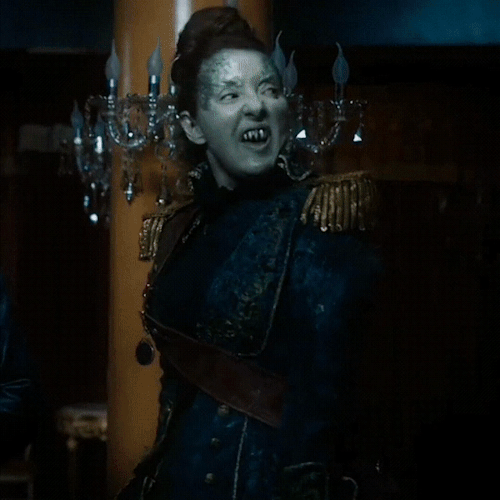
Datum 3: There is another moment in Good Omens when Aziraphale offers Crowley the opportunity to enjoy a joke with him. There, too, his humor lands just as he intends, so we can use this other moment as a comparison to our 1601 moment. I don't have gifs for it, but go back and watch it, S1E6 49:27-42. Snips below.
Aziraphale says something that surprises and amuses Crowley (he asked Hell for a rubber duck while he was sloshing around in the holy water)--
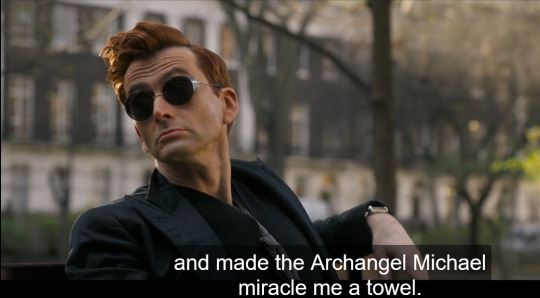
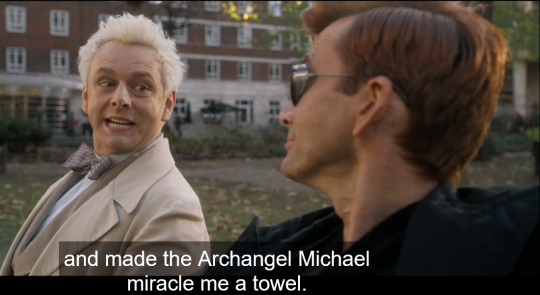
--but what Aziraphale says makes Crowley smile long before it makes him laugh.

In fact, his laugh, though a genuine cackle, is quite delayed, and he laughs only after Aziraphale starts laughing too.
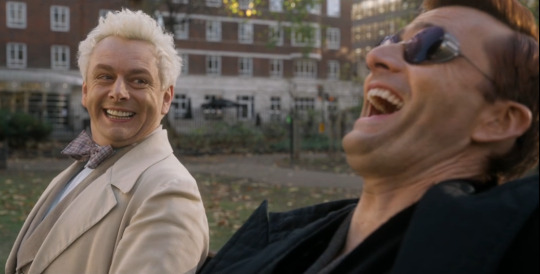
In other words, Crowley's reaction to Aziraphale offering him amusement they're both on the same side of is exactly the same as his reaction to "Come on, Hamlet! Buck up!" right up until he laughs instead of shaking his head. Here, after Armageddidn't, Crowley doesn't have to suppress his reaction, so he can let the smile bloom; he doesn't have to control his response, so, although it takes him a few extra seconds, he lets the smile turn into a laugh.
But in 1601, it's not safe to laugh at Aziraphale's humor. It's not safe even to smile at him. A single piece of evidence or eye/earwitness testimony that he and Crowley have anything more friendly than the most passing and acrimonious of professional relationships could mean death to either or both of them, and depending on what Falling is like, maybe something worse than death for Aziraphale.

But Aziraphale is so funny, so effervescent for Crowley, at Crowley, that it catches Crowley just for a moment. Crowley's eyes widen and the corner of his mouth twitches toward a smile.
And that's dangerous. If Aziraphale keeps acting so charmingly mad, Crowley is going to laugh, and they can't afford that risk, so he shakes his head at Aziraphale. Stop, or I won't be able to keep a straight face around you.

And Aziraphale apparently receives that message, because he immediately eases off. Less than 60 seconds later we learn that he's deeply concerned for Crowley's safety--and that it's not so much that Aziraphale has Crowley wrapped around his little finger as it is that Crowley has wrapped himself around Aziraphale's little finger like a snake arranging itself on the tree branch it calls home.
UPDATE 14/10/23: HOLY SHIT Y'ALL IT GETS EVEN BETTER! THERE IS A SEQUEL!
#good omens#good omens meta#good omens 1601#good omens microexpressions#good omens headshake#angelfish#aziracrow#ineffable husbands#good omens fanalysis
1K notes
·
View notes
Text
They shared one look--ONE. I'm crying, if this was any other show I would probably only see it as comic relief and nothing more. But this is Good fucking Omens, a single insignificant scene can bring about the biggest revelation about a relationship or character--


Like this is still driving me nuts--DAGON of all demons "LORD OF THE FILES, MASTER OF MADNESS, UNDER-DUKE OF THE SEVENTH TORMENT" just up and obeys Michael's 'Quit doing that, now is not the right time' frown face and quick headshake with tiny smirk.
Everything abt this tells me that SOMETHING did happen prior to S2.

Mr. Neil Gaiman, SIR, you can't just write this and expect ME to throw it as if it's nothing...!
#angelfish#dagon x michael#ineffable administrators#probably almost everyone knows they're cooking something#still fine if they're not canon just give me more moments of them being in contact or working together
82 notes
·
View notes
Text
Sept 10, good night
Twas a good day today. Tuesdays and Thursdays are my down day right now. I went to work in the pouring rain and once I arrived, thoroughly drenched, did nothing for the hour and a half. For some reason they don't have any projects, any mailings, or any shirts to fold. (We couldn't tour train due to the torrential rain.)
After work, I stopped by the library and got some help looking at speech models. I'm super excited for my speech now.
I didn't do much until 1, when I had meditation class. We worked on center point breathing and I felt very in tune with my breathing and body during the session.
After meditation I practiced my flute for about 40 minutes! I played all of my band pieces and one orchestra. So many sharps marked.
At 4, I went to my Spanish conversation table. I got totally lost and showed up about 4:20-30. It was all good and I felt better about my Spanish because there were others with my skill level and the student teacher was talking more slowly.
That lasted until about 5:20 and I came back to write my reflection. A bit before 6 I set out to find the women's center, where I was hoping to find some friends at the dinner. Plot twist! I did! So that was kinda cool. Grace and Molly talked to me a bunch and introduced me to all their friends. Unfortunately, when I was sitting with another crowd (mostly people directly involved in the house/ activity) they didn't seem to like my new friends... I decide to continue being friends and to evaluate the people who were talking bad about others with a first year around.
When I arrived Back at the dorm my roomie hadn't gone to supper yet so we went with Nic to the campus grill. I had cheese pizza which was surprisingly good. 10/10 would board again. We also watched Good Omens, which Nic really likes! We are already on episode 4.
I finished my readings for women's history and now I'm all ready for bed.
Today my tics were pretty bad, specifically in the evening and were causing me a lot of pain and frustration. I can't read my textbook if my eyes are fluttering into my head. I can't focus once the headache sets in from that. The new neck/ headshaking tic pops(?) something in my neck right at the base of my skull and literally brings tears to my eyes it hurts so much. I have nausea from it right now, still. Earlier while walking back from the grill, I had to stop and stand still because I was fluttering my eyes so much I couldn't see straight to go through the door. And when roomie opened the door I couldn't hold it for nic because I had an arm tic with the hand I was holding my pizza in and nearly dropped it. I keep snapping loudly and having this vague urge to say "fuck bitches" but in a very specific manner so its never satisfying. What do I do guys??
0 notes
Text
Must re-read
My Favorite Good Omens Moment:
An Essay on Why It Is Cool and Rad
There's this moment in Good Omens that makes me cackle every time I see it and leaves me full of warmth, so here's an essay on its context and meaning, because explication and analysis are how I show love. I will try to keep my thoughts as tight as possible, but they do have a tendency to spiral outwards, and I am very stoned. Come, sistren, and get nerdy with me.
My favorite moment in the series so far occurs in 1601. To approach it we will first need an assload of context. There's a TL;DR in bold at the end of the Context if you don't fancy reading the whole assload. Key arguments are in italics and bold throughout.
David Tennant gives Crowley a very consistent facial expression every time Aziraphale says something so outlandish Crowley can't quite believe he's hearing it. It's this one:


Chronologically, we see the Eyebrows of Disbelief twice before my fave moment in 1601: once (above left) in that scene on the Garden Wall that familiarizes the audience with Crowley's face before adding the dark glasses, when Aziraphale admits he's given away his sword; once when Aziraphale tells Bildad the Shuhite that he, Aziraphale, has Fallen because he lied to the angels to save Job's children.
The Eyebows of Disbelief always signal surprise and amusement with something Aziraphale has said or done. This amusement is sometimes at Aziraphale's expense and sometimes not.
In the gifs above, Crowley is laughing because what Aziraphale has just admitted to doing is fantastic and unexpected and frankly pretty gd punk rock. He's not laughing at Aziraphale, he's laughing because he is delighted with him. The only record we have thus far of Crowley laughing at Aziraphale is this one:


Crowley laughs when Aziraphale informs him--him, a demon who has personally been through the process of Falling--that Aziraphale is Fallen and must be a demon now. As though of the two of them Aziraphale is the expert on how and under what circumstances this occurs.
And yet when Crowley sees Aziraphale's distress--not his fear of being taken to Hell, but his heartbreak and lostness over the fact that his conscience has diverged from God's stated will--Crowley stops laughing, and instead he acts very kindly towards Aziraphale. He validates the gravity of what Aziraphale has done and assures him he won't turn him in. He sits with him so Aziraphale isn't totally alone (like Crowley probably was) as he goes through the loneliest moments of his existence to that point and picks himself up newly weighted with the secret he must now bear.
And after this scene (in canon as it stands thus far), we don't see Crowley laugh at anything Aziraphale says or does again.
And he really has to work for it sometimes. We talk a lot about the things Michael Sheen is able to convey with his face in Good Omens, and absolutely rightly so; David Tennant earns a chunk of his paycheck in this regard as well. If you haven't given yourself the treat yet, rewatch the scene in Will Goldstone's magic shop in 1941 and focus on Crowley's reactions:
youtube
Tennant takes great care to show, with precision, that Crowley is expending effort not to react to Aziraphale's nervous chaos Muppetry and lack of self-awareness. Crowley is self- and socially and contextually aware enough that he knows (better than Aziraphale, at least, which is not a high bar to clear) what's cringe, what's funny, what's ridiculous, how to behave. But whenever Aziraphale crosses a boundary of normalcy, or even sanity, and there is opportunity to laugh at him, Crowley very carefully doesn't react. He doesn't interrupt him, he doesn't try to correct him, he doesn't make fun of him, he doesn't even smirk; he just watches him, as stone-faced as he can manage, no matter how bizarre Aziraphale becomes.
We should be reading this lack of reaction to Aziraphale's social and rational transgressions as powerful positive action. Go watch the Doctor Who episode "Human Nature," or literally any episode of The Inbetweeners, or read or watch Regeneration, and reflect on what it shows you about English masculinity; then consider again the depth of significance in how English- and male-coded character Crowley treats English- and male-coded character Aziraphale in an England created by an English and male-codedpresenting author based off a book written by himself and another male-presenting author. Within its context of English masculinity, Crowley's lack of reaction is not a neutral stance; it is a very fucking loud show of support.
This is not even an inference; it's stated outright in the show. Crowley himself puts it into words 422 years after my favorite moment:

You know how Crowley calls Aziraphale "angel" because the factuality of the descriptor offers him plausible deniability to any Heavenly or Infernal agents who might be listening? Remember how Crowley is a great equivocator? Crowley is equivocating here, too: he's using the cover of what Maggie and Nina will take as a disparaging joke at Aziraphale's expense in order to make a perfectly sincere statement. This is his genuine perception of one of the relationship dynamics he has with Aziraphale and how he feels about that dynamic. Crowley thinks he himself is quite witty (an accurate assessment), Crowley thinks Aziraphale isn't sufficiently self- or contextually aware to hide how strange he is and therefore frequently says and does mad things (also an accurate assessment), and Crowley is Into. That. Shit.
Okay. Now let's look at 1601.
Chronologically it's been almost 1,000 years since we last saw Aziraphale and Crowley. In 537, Aziraphale isn't willing even to consider a labor-saving working arrangement with Crowley of fucking off home out of the damp of Arthurian Wessex; but by 1601, he's worked (and met, and Arranged) with Crowley "dozens of times now," Crowley says, and Azirapahle does not correct him.
In that millienium, Aziraphale has grown to care deeply about Crowley:

In fact he may be somewhat smitten with him:

Seriously, go back and watch Aziraphale here as Crowley approaches and starts speaking to him: he doesn't start smiling until he recognizes that the person speaking to him is Crowley (but he only smiles at Crowley while Crowley's not looking at him).
And Crowley is definitely become smitten with Aziraphale:



Our man(-shaped entity) is so allergic to work he sets up a meeting to weasel, cajole, or (as it happens) cheat a coin toss to get Aziraphale to do an easy temptation for him in Edinburgh, and then in the same conversation agrees to miracle a play into success because Aziraphale gives him a single hopeful look. Crowley's got it bad.
TL;DR: The Eyebrows of Disbelief happen when Crowley is surprised and amused by something Aziraphale has said or done. Sometimes that amusement is delight with Aziraphale; sometimes it is at Aziraphale's expense. Crowley is aware of this distinction, and when his amusement is at Aziraphale's expense, he suppresses it, even when it takes some effort on his own part, and remains stocially composed. This is equivocation on his part: to Celestial/Infernal operatives lacking knowledge of the intricacies of human behavior, this non-reaction would seem like neutrality; to Aziraphale, who shares with Crowley and the audience the contextual knowledge of English masculinity's utter viciousness, this non-reaction is a profound show of support; and in the safety of support from Crowley, Aziraphale lets his weirdness bloom.
As another meta points out [link if I find it again], we also see in Aziraphale's wordless request about Hamlet and Crowley's immediate understanding of it that by 1601 Aziraphale and Crowley have developed an unspoken, coded method of communication with each other.
Now that we have all of that in mind, here's my favorite moment in Good Omens:




Ixi of Fuck Yeah Good Omens has even kindly archived a closeup of the aftermath, for Crowley, of "Buck up!" In gif 4, above, you can see that the tiny smile is an involuntary reaction that happens as Crowley's eyes widen: for a fraction of a second, he's caught off-guard. In the closeup it's easier to see that he suppresses the smile and gives a tiny shake of his head, Eyebrows of Disbelief heading for his hairline.
There are a number of things Crowley's reaction could mean and what messages it could communicate (we'll get to that in a sec), but regardless, his reaction is, unquestionably, one of surprise and suppressed amusement. This is an aspect of Crowley and Aziraphale's relationship and characters that I like very much, viz., that one of the reasons Crowley likes Aziraphale (though Aziraphale is judgy and occasionally, unintentionally, horrifyingly cruel) is that in addition to being one of the kindest and most courageous beings in existence, Aziraphale is mad as a bag of frogs. Crowley does not know what is going to come out of Aziraphale's lovely mouth next, but Crowley does know there's a good chance he will struggle to believe he's hearing it, and Crowley likes that.
That's what makes this my favorite moment. What makes this moment so cool and rad, though, is its ineffability. We know from the Eyebrows of Disbelief that Crowley is surprised and amused, but any of several things could be read in that almost imperceptible headshake. Like:
What are you doing? or
Why are you like this? or
How can you be aware that you say these things out loud and yet still say them out loud? or
How has my existence come to this? this moment of listening to such insanity?
each of which is a fair and just feeling to have/message to communicate to a man(-shaped entity) who is yelling "Buck up!" at Hamlet.
But that's only if we read Crowley's amusement as being at Aziraphale's expense. And I don't think we should. Because watch Aziraphale here:

He's doing it on purpose. He is shouting a hilariously inappropriate, 100% authentic Aziraphale-brand thing over arguably the gloomiest passage of Shakespeare's famously gloomy play--right after Crowley complains about its gloominess--and he is watching Crowley as he does it. Look at his smile! He knows he's being Deeply Uncool, and he is doing it literally right into Crowley's face.
Remember that we just talked about how by this point in the chronology Crowley and Aziraphale have learned to communicate with each other nonverbally through facial expression? So what does it mean when Aziraphale responds to Crowley's grumbling about Hamlet's gloominess by smiling his minxious Mona Lisa Aziraphale smile, looking right into Crowley's face, and yelling at Hamlet to buck up? Aziraphale, in a carefully coded, carefully Aziraphale way, is joking with Crowley. His silliness in this moment is for Crowley.
So with aaaaaaallllll of this essay in mind, what does it mean that Crowley's reaction to "Come on, Hamlet! Buck up!" is widening eyes, an involuntary twitch of his mouth toward a smile, and then, his eyebrows still showing surprise and amusement, a tiny shake of his head?
Once more, with inferences:


I do propose, y'all, on the basis of this web of evidence I submit for consideration, that what we are seeing here in my favorite moment of Good Omens is the ineffable equivalent of Aziraphale and Crowley sharing a laugh.
Crowley's amusement here isn't at Aziraphale, because Aziraphale is eliciting that amusement consciously and deliberately. Aziraphale, in good spirits and happy to see Crowley, uses his Aziraphaleness to offers Crowley not only an opportunity for amusement, but the opportunity to be in agreement with him about what in this situation is funny. They're on the same side of this joke.
And his humor lands just as he wants it to: Crowley, just for a moment, is caught off-guard, and tickled--
But remember, Crowley is worried in this scene about being surveilled ("I thought you said we'd be inconspicuous here"), and he worries about audio surveillance a lot ("Walls have ears"; "Don't say that. If my lot hear [etc.]," etc.), so he's very limited in what reactions he can show or voice. Aziraphale knows Crowley must be perceived by anyone watching or listening to disapprove of his, Aziraphale's, behavior (just as he must be perceived to disapprove vociferously of Crowley's). Both of them know this.

--so Crowley suppresses the smile almost successfully, and shakes his head at Aziraphale, minutely, to say Stop. What you're doing is working, you're close to making me laugh, and if I show how much you have just delighted me, it will blow our cover of "just an Arrangement."
I offer three final data points in advancing my argument that what we see in my favorite Good Omens moment is Aziraphale successfully attempting to joke with Crowley and Crowley recognizing that overture from Aziraphale and being momentarily surprised into a reaction of genuine delight before pulling his face back under control and indicating to Aziraphale that he must stop:
Datum 1. Nothing going on with Crowley's face in this moment is accidental. We know for sure we're not seeing David Tennant react to Michael Sheen here not only because of literally every other point of Tennant's and Sheen's performances in the show, but because Tennant is wearing opaque contacts and sunglasses under film lighting and therefore cannot be reacting to anything more compelling than a level-10-lift blur because Tennant cannot see shit. Crowley's reaction is a deliberate and careful performance choice on Tennant's part, and it's underscored by director Douglas Mackinnon's choice to film Tennant in 1/2 profile to keep Crowley's eyes visible and face readable to the audience. This reaction is supposed to be there and supposed to be meaningful.
Datum 2. The husbands in 1601 is not the only moment in Good Omens when we may be seeing an angel and a demon communicate the message Stop doing that, it makes us look too familiar between themselves with a little headshake:

Datum 3: There is another moment in Good Omens when Aziraphale offers Crowley the opportunity to enjoy a joke with him. There, too, his humor lands just as he intends, so we can use this other moment as a comparison to our 1601 moment. I don't have gifs for it, but go back and watch it, S1E6 49:27-42. Snips below.
Aziraphale says something that surprises and amuses Crowley (he asked Hell for a rubber duck while he was sloshing around in the holy water)--


--but what Aziraphale says makes Crowley smile long before it makes him laugh.

In fact, his laugh, though a genuine cackle, is quite delayed, and he laughs only after Aziraphale starts laughing too.

In other words, Crowley's reaction to Aziraphale offering him amusement they're both on the same side of is exactly the same as his reaction to "Come on, Hamlet! Buck up!" right up until he laughs instead of shaking his head. Here, after Armageddidn't, Crowley doesn't have to suppress his reaction, so he can let the smile bloom; he doesn't have to control his response, so, although it takes him a few extra seconds, he lets the smile turn into a laugh.
But in 1601, it's not safe to laugh at Aziraphale's humor. It's not safe even to smile at him. A single piece of evidence or eye/earwitness testimony that he and Crowley have anything more friendly than the most passing and acrimonious of professional relationships could mean death to either or both of them, and depending on what Falling is like, maybe something worse than death for Aziraphale.

But Aziraphale is so funny, so effervescent for Crowley, at Crowley, that it catches Crowley just for a moment. Crowley's eyes widen and the corner of his mouth twitches toward a smile.
And that's dangerous. If Aziraphale keeps acting so charmingly mad, Crowley is going to laugh, and they can't afford that risk, so he shakes his head at Aziraphale. Stop, or I won't be able to keep a straight face around you.

And Aziraphale apparently receives that message, because he immediately eases off. Less than 60 seconds later we learn that he's deeply concerned for Crowley's safety--and that it's not so much that Aziraphale has Crowley wrapped around his little finger as it is that Crowley has wrapped himself around Aziraphale's little finger like a snake arranging itself on the tree branch it calls home.
#good omens#good omens meta#good omens 1601#good omens microexpressions#good omens headshake#angelfish#aziracrow#ineffable husbands#love#must read
1K notes
·
View notes